Senior DevOps Engineers are the backbone of modern software development and operations. They ensure that development, testing, and deployment processes are streamlined and efficient, bridging the gap between software development and IT operations.
Skills for a Senior DevOps Engineer include proficiency in automation tools, cloud services, and scripting languages, as well as strong problem-solving abilities and effective communication skills.
Candidates can write these abilities in their resumes, but you can’t verify them without on-the-job Senior Devops Engineer skill tests.
In this post, we will explore 8 essential Senior Devops Engineer skills, 9 secondary skills and how to assess them so you can make informed hiring decisions.
Table of contents
8 fundamental Senior Devops Engineer skills and traits
The best skills for Senior Devops Engineers include Infrastructure Automation, Continuous Integration, Continuous Deployment, Containerization, Monitoring and Logging, Cloud Services, Security Practices and Scripting Skills.
Let’s dive into the details by examining the 8 essential skills of a Senior Devops Engineer.
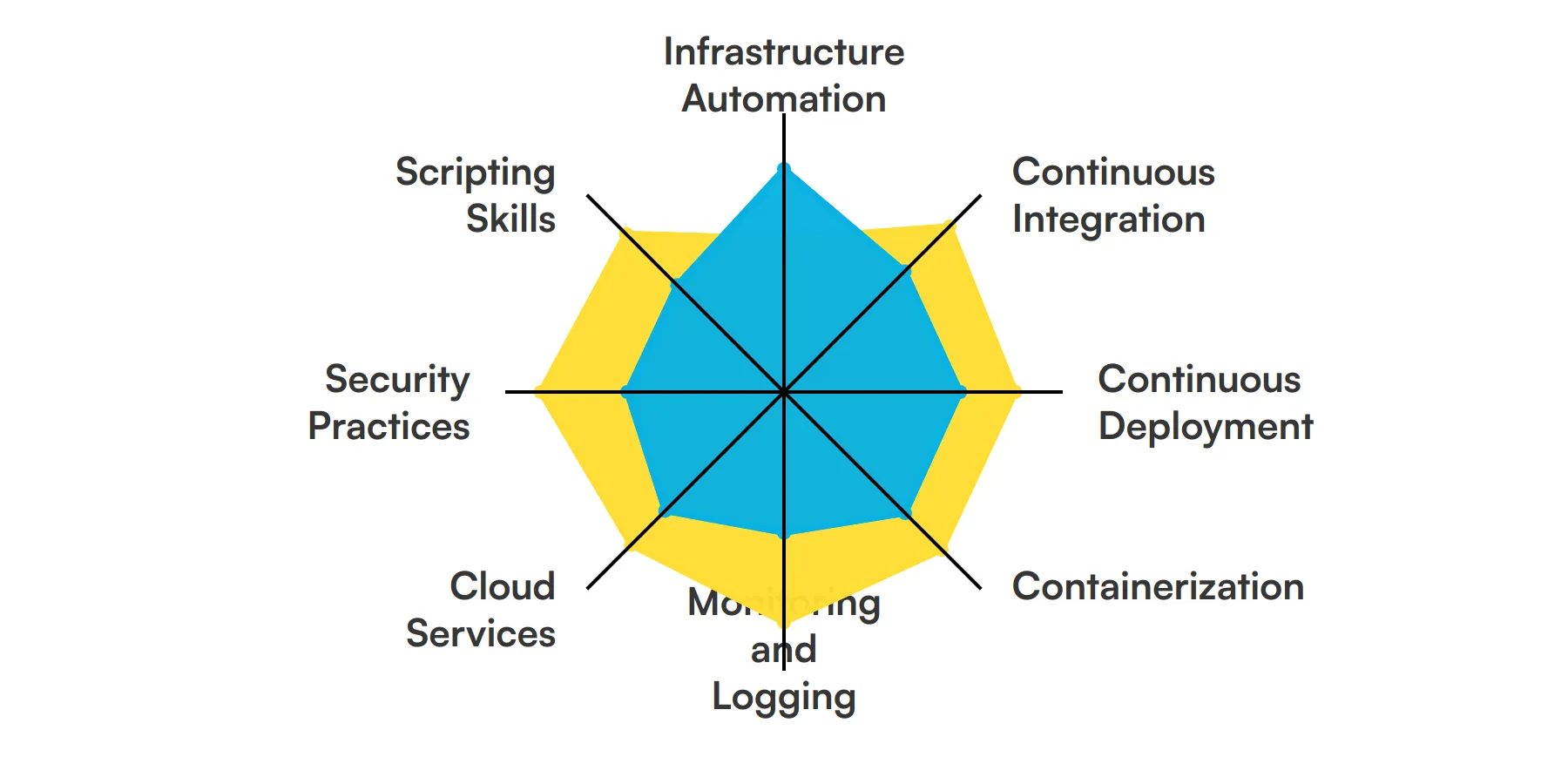
Infrastructure Automation
A Senior DevOps Engineer leverages infrastructure automation to streamline the setup and maintenance of servers and software environments. By using tools like Ansible, Terraform, or Chef, they ensure consistent, repeatable processes that reduce human error and enhance deployment speeds.
For more insights, check out our guide to writing a Automation Engineer Job Description.
Continuous Integration
Continuous Integration (CI) is critical for a Senior DevOps Engineer to merge code changes frequently, enabling early detection of integration bugs. This practice supports maintaining a high-quality codebase and facilitates quick iterations in a dynamic development environment.
Continuous Deployment
Continuous Deployment (CD) extends CI by automatically deploying all code changes to a production environment after the build stage. This skill ensures that the Senior DevOps Engineer can deliver features and fixes to customers quickly and reliably.
Check out our guide for a comprehensive list of interview questions.
Containerization
Containerization involves encapsulating an application and its environment to ensure consistency across multiple development and staging environments. This skill is essential for a Senior DevOps Engineer to manage and scale deployments efficiently using platforms like Docker and Kubernetes.
Monitoring and Logging
Effective monitoring and logging enable a Senior DevOps Engineer to track the performance of applications and infrastructure in real time. Utilizing tools like Prometheus and ELK Stack, they can preemptively address issues before they impact the user experience.
For more insights, check out our guide to writing a Devops Engineer Job Description.
Cloud Services
Proficiency in cloud services like AWS, Azure, or Google Cloud is necessary for a Senior DevOps Engineer to manage scalable, on-demand computing resources. They use these platforms to optimize the cost and performance of applications.
Security Practices
Security practices are integral to protect sensitive data and maintain trust. A Senior DevOps Engineer implements strategies such as secure access, data encryption, and compliance audits to safeguard the infrastructure and applications.
Check out our guide for a comprehensive list of interview questions.
Scripting Skills
Scripting skills in languages like Bash, Python, or PowerShell allow a Senior DevOps Engineer to write automation scripts that enhance productivity and reduce manual intervention in routine tasks.
9 secondary Senior Devops Engineer skills and traits
The best skills for Senior Devops Engineers include Version Control, Networking Fundamentals, Performance Tuning, Database Management, Incident Management, Compliance Knowledge, Project Management, Cost Optimization and Documentation.
Let’s dive into the details by examining the 9 secondary skills of a Senior Devops Engineer.
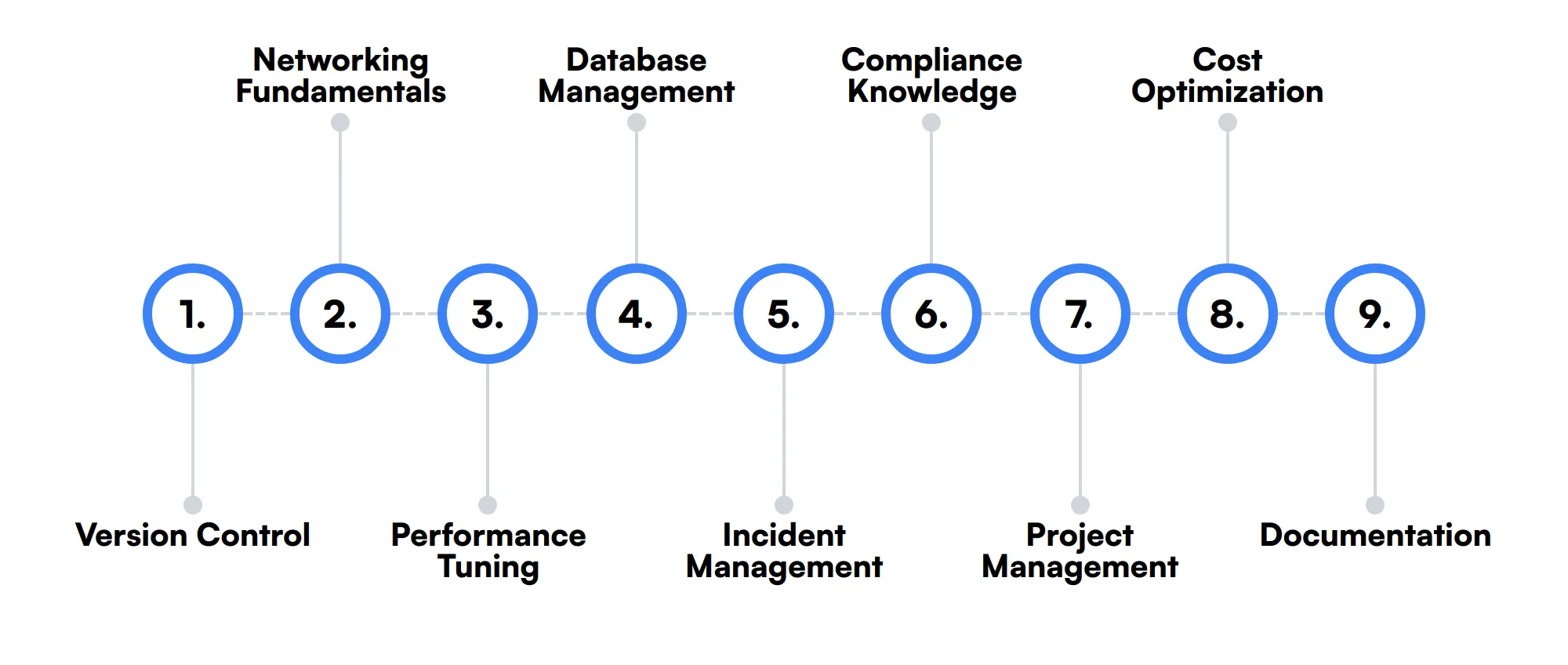
Version Control
Understanding version control systems like Git is necessary for managing code revisions and collaborating effectively in team settings.
Networking Fundamentals
Knowledge of networking fundamentals ensures that a Senior DevOps Engineer can troubleshoot connectivity issues and optimize the flow of data through networks.
Performance Tuning
The ability to tune system and application performance helps in optimizing resource use and improving the end-user experience.
Database Management
Skills in database management are important for handling data persistence, performing backups, and ensuring data integrity in software applications.
Incident Management
Experience in incident management helps in quickly resolving outages and disruptions, thereby maintaining service reliability and availability.
Compliance Knowledge
Understanding compliance requirements relevant to the industry helps in adhering to legal and security standards.
Project Management
Project management skills assist in planning, executing, and closing projects efficiently, ensuring that objectives are met on time and within budget.
Cost Optimization
Skills in cost optimization ensure that resources are used efficiently, reducing unnecessary expenses without compromising on performance.
Documentation
Effective documentation practices are crucial for maintaining clear and accessible information on system configurations and operational procedures.
How to assess Senior Devops Engineer skills and traits
Assessing the skills and traits of a Senior DevOps Engineer involves more than just glancing at a resume. It requires a deep understanding of their technical capabilities and how they apply these skills in real-world scenarios. The challenge lies in evaluating their proficiency in key areas such as Infrastructure Automation, Continuous Integration, and Security Practices, among others.
Traditional interviews often fall short in accurately gauging a candidate's true abilities in these complex domains. This is where practical assessments come into play. By utilizing skills assessments, employers can get a clearer picture of a candidate's ability to handle the demands of a Senior DevOps role.
Adaface assessments offer a tailored approach to evaluating the multifaceted skills of Senior DevOps Engineers. These assessments are designed to mirror the actual challenges they will face on the job, ensuring that candidates are tested on relevant skills like Containerization, Monitoring and Logging, and Cloud Services. By integrating Adaface tests into your hiring process, you can achieve a 2x improvement in the quality of your hires and significantly reduce the time spent screening candidates.
Let’s look at how to assess Senior Devops Engineer skills with these 6 talent assessments.
Terraform Online Test
Terraform Online Test evaluates a candidate's ability to use Terraform for infrastructure as code, allowing them to create, deploy, and manage multi-cloud environments efficiently.
The test assesses their skills in writing and parameterizing Terraform configurations, managing state, and using Terraform templates for deploying various services such as Web Apps, Databases, and Kubernetes clusters.
Candidates who perform well demonstrate a strong grasp of deploying and scaling infrastructure using Terraform, which is critical for effective DevOps practices in dynamic cloud environments.
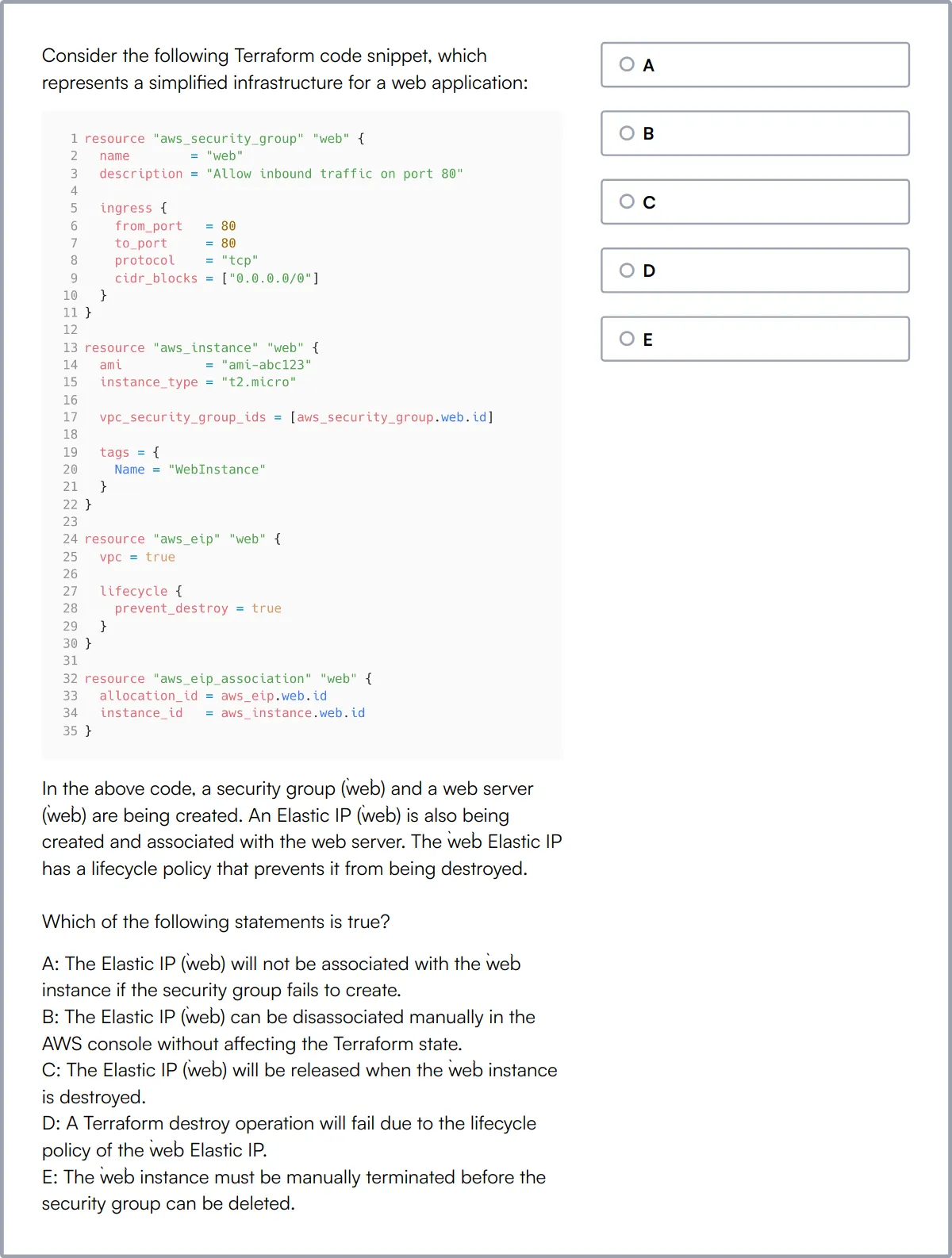
DevOps Test
DevOps Test is designed to assess a candidate's proficiency across a range of DevOps tools and practices, including Linux, Git, Python, and Docker.
This test evaluates their understanding of Git workflows, Docker container management, Linux commands, and Python scripting capabilities.
High-scoring candidates will demonstrate a comprehensive understanding of the integration and automation processes essential for optimizing DevOps workflows.
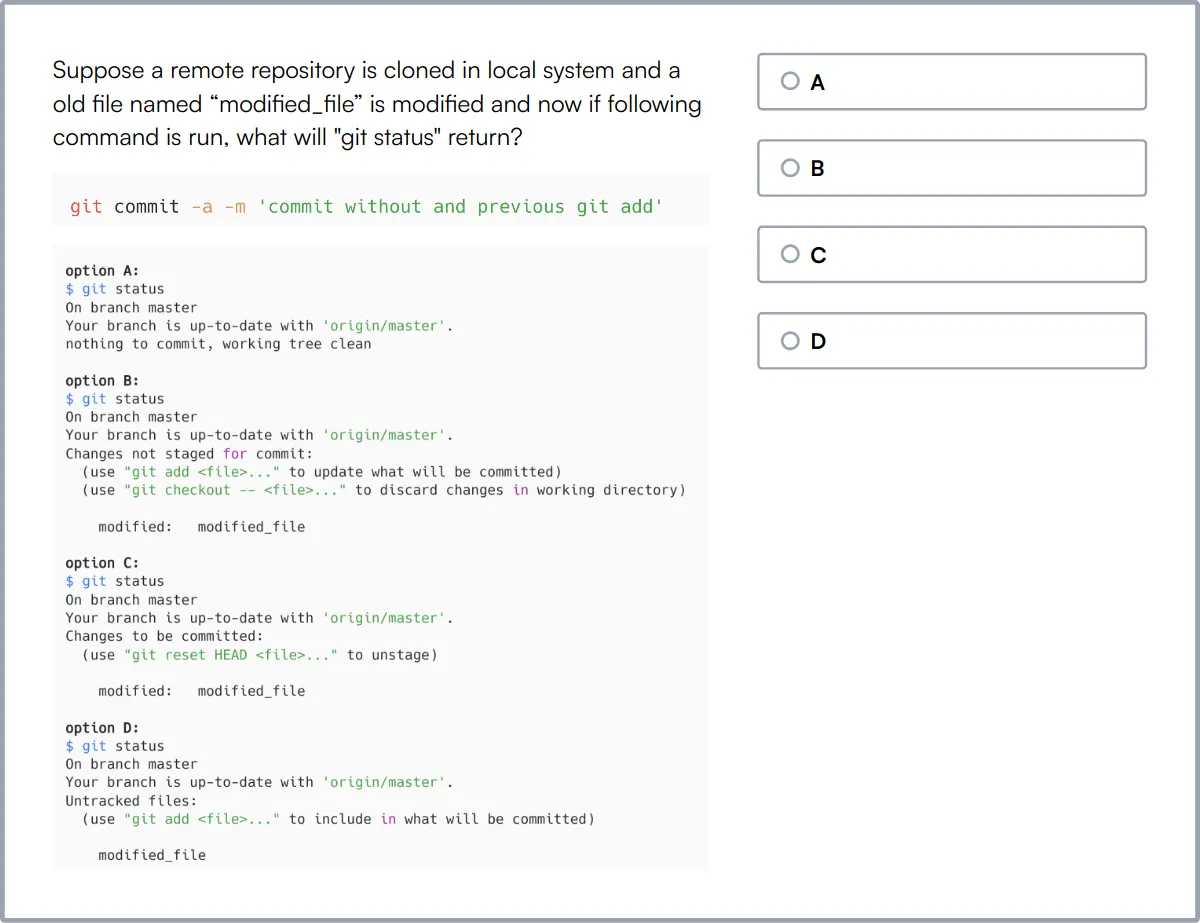
Docker Online Test
Docker Online Test focuses on a candidate's expertise in Docker technologies, assessing their ability to build, manage, and secure Docker environments.
The test covers Docker container operations, image management, networking, volumes, and the use of Docker Compose for orchestrating multi-container applications.
Successful candidates will show proficiency in Docker security and troubleshooting, which are key for maintaining reliable containerized applications.
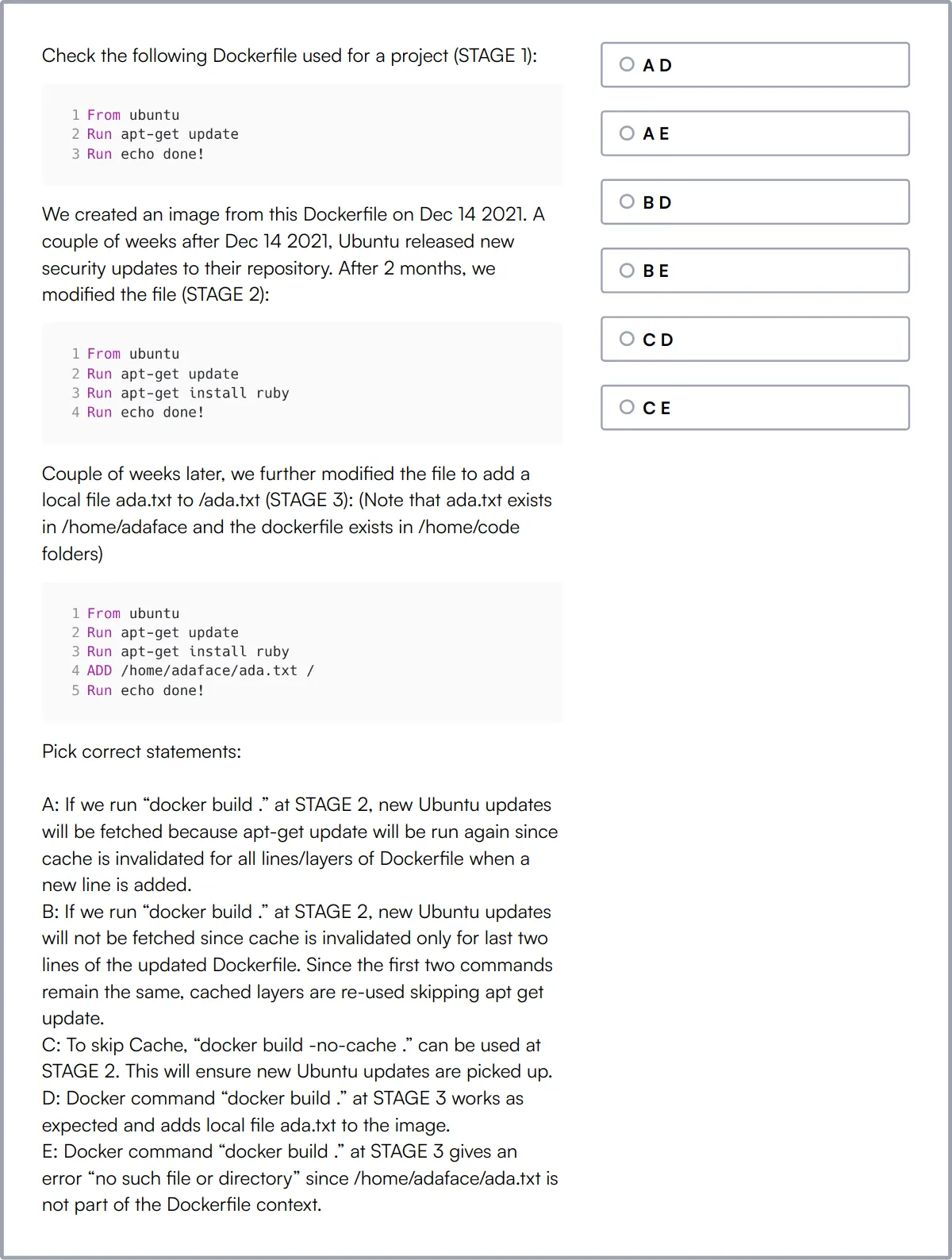
Elasticsearch Test
Elasticsearch Test measures a candidate's ability to design and manage Elasticsearch solutions, focusing on data indexing, search queries, and cluster management.
It evaluates their skills in configuring search queries, data modeling, and performance optimization to ensure efficient data retrieval and scalability.
Candidates excelling in this test are adept at deploying and optimizing Elasticsearch clusters, crucial for real-time search and analytics applications.
AWS DevOps Test
AWS DevOps Test assesses a candidate's skills in AWS cloud services and their application in DevOps practices.
The test evaluates their knowledge in managing AWS configurations, troubleshooting, and scripting with Python, alongside Linux fundamentals.
Effective candidates demonstrate a strong ability to integrate AWS services into DevOps workflows, facilitating continuous integration and delivery.
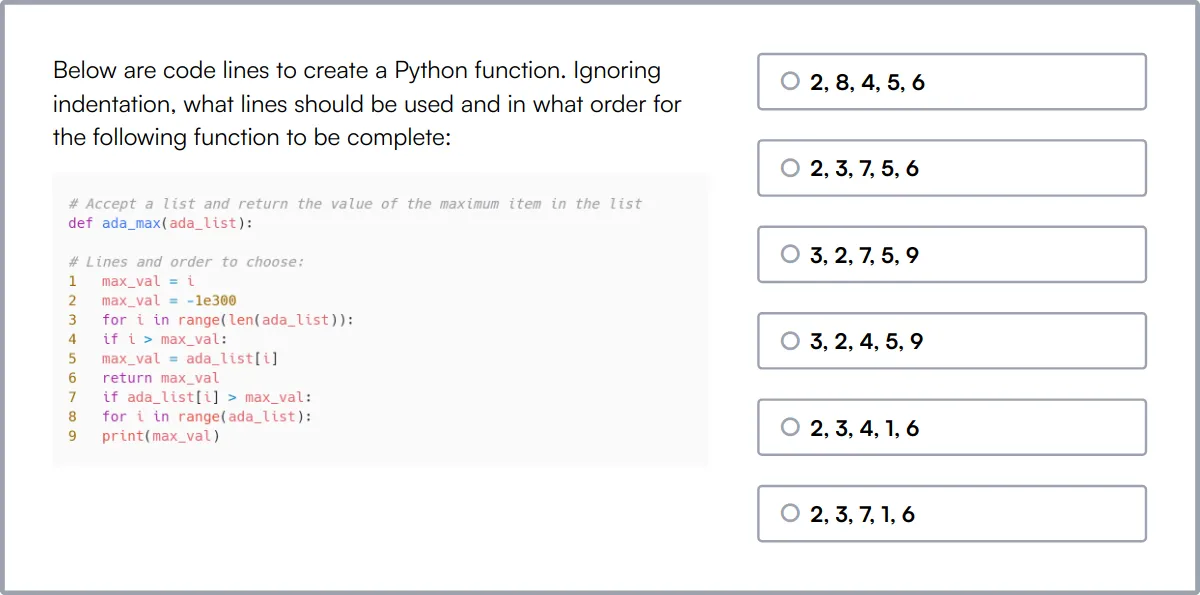
Cyber Security Assessment Test
Cyber Security Assessment Test evaluates a candidate's understanding of cybersecurity principles and their ability to protect networks and systems against threats.
This test assesses their knowledge in network security, cybersecurity attacks, cryptography, and web security, including the ability to conduct risk assessments and implement security defenses.
Candidates who score well are proficient in identifying vulnerabilities and implementing security measures to safeguard digital assets against various cyber threats.
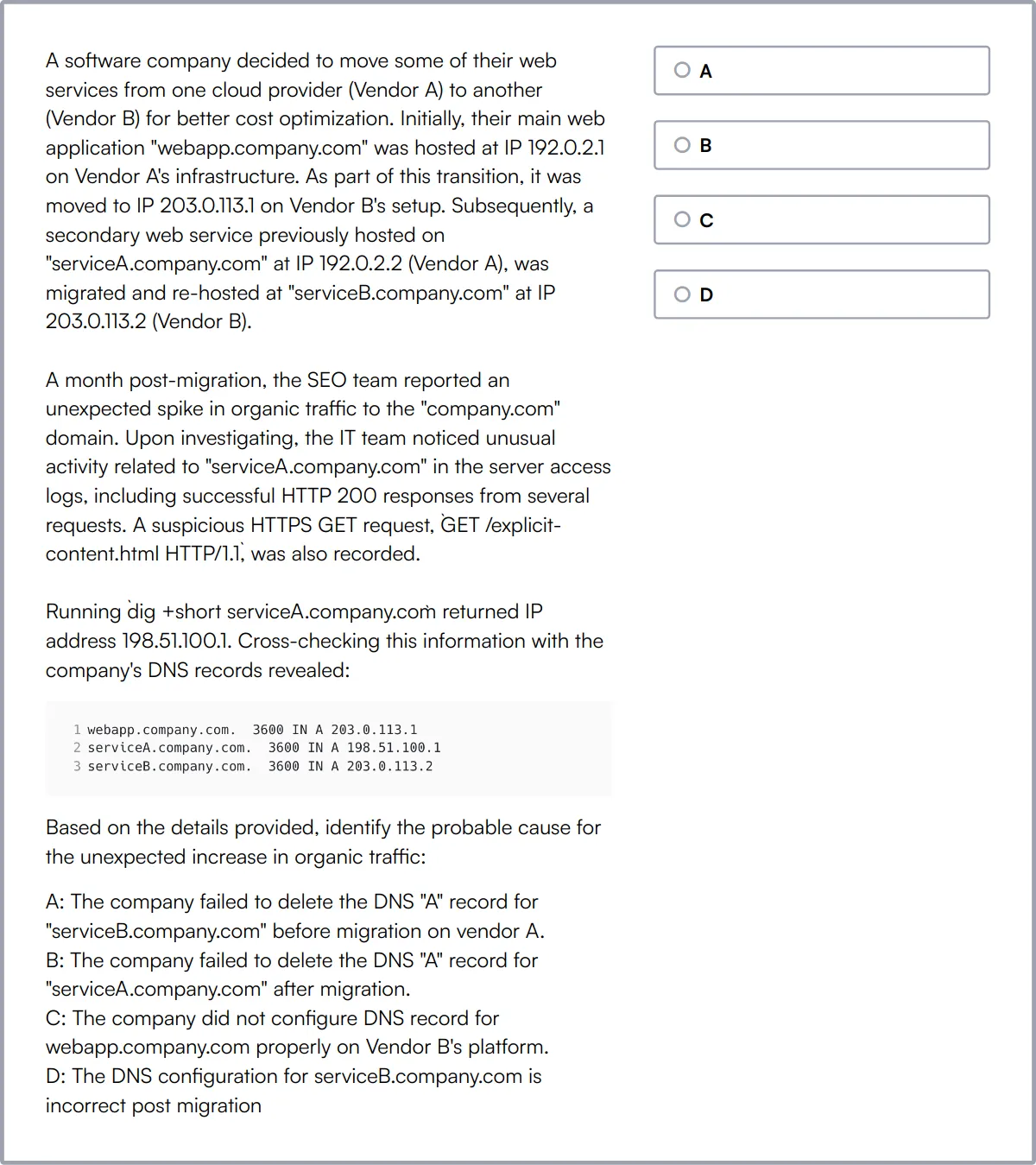
Summary: The 8 key Senior Devops Engineer skills and how to test for them
| Senior Devops Engineer skill | How to assess them |
|---|---|
| 1. Infrastructure Automation | Evaluate ability to automate and manage infrastructure configurations. |
| 2. Continuous Integration | Assess proficiency in merging code changes frequently and automatically. |
| 3. Continuous Deployment | Check capability to deploy all code changes to production swiftly. |
| 4. Containerization | Determine expertise in using containers to encapsulate an application's environment. |
| 5. Monitoring and Logging | Review skills in tracking applications and diagnosing issues through logs. |
| 6. Cloud Services | Examine knowledge of managing and scaling applications on cloud platforms. |
| 7. Security Practices | Assess understanding and implementation of secure coding and deployment practices. |
| 8. Scripting Skills | Evaluate proficiency in writing scripts for task automation. |
Azure DevOps Test
Senior Devops Engineer skills FAQs
What is infrastructure automation in DevOps?
Infrastructure automation involves using tools like Terraform or Ansible to manage and provision computing resources automatically. It helps in maintaining consistency and reducing manual errors.
How can you assess a candidate's continuous integration skills?
Ask about their experience with CI tools like Jenkins or GitLab CI. Request examples of pipelines they've built and how they handle build failures.
Why is containerization important for a Senior DevOps Engineer?
Containerization, using tools like Docker or Kubernetes, allows for consistent environments across development, testing, and production. It simplifies deployment and scaling.
What should you look for in a candidate's monitoring and logging skills?
Evaluate their familiarity with tools like Prometheus, Grafana, or ELK stack. Ask how they set up alerts and handle incidents based on logs and metrics.
How do you assess a candidate's cloud services expertise?
Inquire about their experience with AWS, Azure, or Google Cloud. Ask for specific examples of services they've used and how they optimized cloud resources.
What scripting languages should a Senior DevOps Engineer know?
Common scripting languages include Python, Bash, and PowerShell. Assess their ability to write scripts for automation tasks and problem-solving.
How important is version control knowledge for a DevOps role?
Version control, using tools like Git, is essential for collaboration and tracking changes. Ask about their experience with branching strategies and resolving merge conflicts.
What are key aspects of incident management in DevOps?
Incident management involves identifying, responding to, and resolving incidents. Look for experience with incident response plans, root cause analysis, and post-mortem reviews.
Assess and hire the best Senior Devops Engineers with Adaface
Assessing and finding the best Senior Devops Engineer is quick and easy when you use talent assessments. You can check out our product tour, sign up for our free plan to see talent assessments in action or view the demo here:

40 min skill tests.
No trick questions.
Accurate shortlisting.
We make it easy for you to find the best candidates in your pipeline with a 40 min skills test.
Try for freeRelated posts
Free resources



